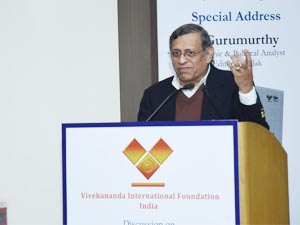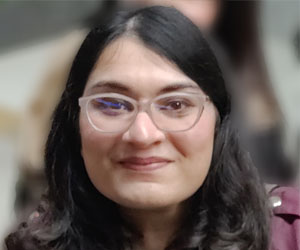A Special Lecture by Shri S. Gurumurthy, was organized at Vivekananda International Foundation on December 27, 2019 in the latest session of the monthly Vimarsha series. Shri Gurumurthy, Chairman-VIF and Editor-Tughlak, is a senior Economic & Political Analyst, and a renowned author. He also serves as the Independent Director in the Board of Governors of the Reserve Bank of India.
The session also marked the launch of Shri RNP Singh’s latest book: Politics of Opportunism: Regional Parties, Coalitions, Centre-State Relations in India. Shri Singh, currently a senior fellow at VIF, is a former officer of the Intelligence Bureau, Government of India. He has been accorded several awards such as the Presidents Police Medal and Indian Police Medal. Dr. Arvind Gupta, Director, VIF, in his welcome address emphasized the relevance of the book in the current socio-political scenario. He praised Shri Singh’s prolific writing prowess, mentioning his earlier works on a slew of topics, ranging from role of Sardar Patel as a unifier, to riots in India; and the Pakistani intelligence agency-ISI.
Shri Singh’s recent book is a comprehensive and highly-readable account of Indian politics as it has developed at the state-and central level since Independence. It analyses the decline of the Indian National Congress that led to the rise of regionalism and coalition politics in the country. According to the author, the rise of regional political parties is as much a reflection of the evolving opportunistic nature of politics, as it is of the vast regional diversity in the country. The book brings out the challenges facing Indian polity due to this phenomena which has resulted in a political system that is highly opportunistic, devoid of ideologies and focused on narrow interests and identities.
According to the book, a framework of healthy cooperative federalism is key to India’s success, which however, often gets overlooked as parties focus on narrow issues that garner them votes instead of pursuing national interest. In his view, the age of coalitions will last for long as no single party is capable of ruling a diverse country such as India. Effective coordination among parties – a prerequisite for this – is hindered due to a breakdown of mutual trust leading to political instability. Students of politics and governance will find the book especially useful.
Shri Gurumurthy began his address by ascribing the emergence of regionalism in Indian politics as a response to the inevitable concentration of power in Delhi over the years resulting in its indifference towards rest of the country. He describes Delhi as a city that yields power, experiences power, dispenses power, and likes power. Giving the example of his home state of Tamil Nadu, Shri Gurumurthy explained that it is this cloistered and power-centric attitude of political leadership in Delhi that aided regional parties in gaining political base despite lacking a clear ideology or linkages to culture. He identified the need for a wider, pan-Indian thought initiative as opposed to Delhi’s narrow, inward perspective that alienates the rest of the country.
On the other hand, Shri Gurumurthy added, Delhi also provides the opportunity for the vast diversity within India to converge. The Parliament being the epitome of a melting pot with representation from across the country. He made the poignant point that even with more than four-thousand political parties in the “Political Theatre of India”, the country continues to be functional democracy that remains united due to an inherent integrating factor. He posits that it is the underlining philosophical rather than ideological basis of Indian politics that plays a part in uniting the country, despite its unfathomable diversity. It is the tolerance for varied perspectives which is inherent in the Indian way of life, which holds the country together.
Shri Gurumurthy invoked the tale of Bahuka from the Mahabharata to underscore how deeply a sensibility of State-Societal relations is ingrained within our cultural texts. It is this internalized notion that had contributed to the unity of the country. He explained that the paradigm shift in Indian politics towards regionalism took place with the 1969 split in the Congress Party - a mega political movement which had hitherto been devoid of ideology – that created a leadership vacuum. He added that like in the mythological tale, it was due to the failure and intolerance of the Congress’ political leadership that regionalism borne out of opportunism rose in politics.
Further, Shri Gurumurthy identified two types of regionalism- the permissible one, based on principles, and the dangerous one, resulting from opportunism. While the former emerges as a response to arrogance of Central political leaders, he added that it’s the latter which led to irresolvable differences in the past that continue to plague the country even today. He added that regionalism in its current form in the country is devoid of reason and falls into the latter category.
Recounting his days of political activism during the period of Emergency, he explained how regional politicians during their initial days had been the crucial link between contemporary political institutions and the traditional society that helped democracy take roots in the country. He added there is a need for co-opting locally accepted community leaders into national politics in order to replace feelings of alienation and integrate them into the national mainstream. This can be done by working towards creating a political model based on principles rather than politics of opportunism, and incorporating Indian ethos with Westphalian principles.
Shri Gurumurthy concluded his remarks by analyzing the current developments in the country in opposition to the Citizenship Amendment Act (CAA). Tracing the history of political debates over the years on this issue, he highlighted the opportunistic stand of the very political leaders who had supported it earlier. He remarked that the protests against the CAA are a disturbing and disgusting effect of this dangerous political opportunism.
The speech was followed by a questions and answers round when audience members further deliberated and contributed to the relevant discussion.










Post new comment